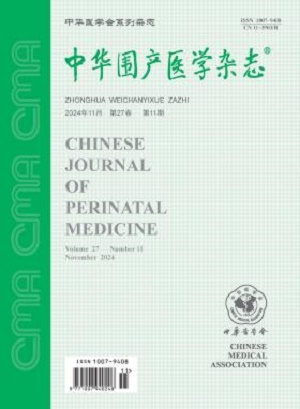专家对母亲感染情况下母乳喂养的共识
Q4 Medicine
引用次数: 1
摘要
母乳是婴儿最好的食物。然而,由于担心病原体的母婴传播(MTCT),即使在没有相关证据的情况下,母体感染也可能导致停止母乳喂养。根据母婴传播的进展,中国围产期医学专家组就孕产妇感染与母乳喂养达成以下共识:(1)感染肝炎病毒的母亲,包括甲型、乙型、丙型和戊型肝炎,建议母乳喂养婴儿;(2)当母亲巨细胞病毒IgG阳性时,足月或晚期早产儿(胎龄≥32周或出生体重≥1 500 g),建议母乳喂养,但对于早期早产儿(胎龄<32周或出生体重<1 500 g),建议母乳喂养;当校正胎龄≥32周或≥1 500 g时,建议先用消毒过的母乳喂养,然后再进行母乳喂养;(3)感染疱疹病毒的母亲,除乳房感染外,可直接母乳喂养;(4)感染流感病毒或SARS-CoV-2的母亲所生的婴儿可以用表达的母乳喂养,不需要绝育;(5)感染艾滋病毒的母亲所生的婴儿尽可能采用纯配方喂养。(6)当母亲感染结核、梅毒螺旋体、钩端螺旋体、刚地弓形虫或疟原虫时,婴儿可在病原体特异性治疗前和治疗期间接受巴氏消毒母乳,在标准治疗后转为直接母乳喂养;(7)哺乳期妇女接种灭活疫苗或减毒活疫苗均不会对婴儿造成不良反应。(8)婴儿可以在母乳喂养的同时接种疫苗;(9)虽然巴氏灭菌会部分破坏母乳中的一些生物活性成分和营养成分,但巴氏灭菌的母乳仍然比配方奶对后代更有益。中华医学会版权所有©2021。本文章由计算机程序翻译,如有差异,请以英文原文为准。
Expert consensus on breastfeeding in case of maternal infections
Human breast milk is the best food for infants. However, maternal infection may result in cessation of breastfeeding, because of concerns on mother-to-child transmission(MTCT) of pathogens, even in the absence of relevant evidence. Based on the progress on MTCT, Chinese experts group on perinatal medicine developed the following consensus on maternal infections and breastfeeding: (1) Mothers infected with hepatitis viruses, including hepatitis A, B, C, and E, are recommended to breastfeed their infants;(2) When mothers are positive for cytomegalovirus IgG, for full-term or late preterm infants (gestational age≥32 weeks at birth or birth weight ≥1 500 g), breastfeeding is recommended, but for early preterm infants (gestational age <32 weeks at birth or birth weight <1 500 g), sterilized breast milk is recommended first and then breastfeeding when corrected gestational age ≥32 weeks or ≥1 500 g;(3) Mothers infected with viruses in Herpes viridae, except for infection on breast, can directly breastfeed their infants;(4) Infants born to mothers with influenza virus or SARS-CoV-2 can be fed with expressed breast milk with no requirement for sterilization;(5) Infants of HIV-infected mothers are recommended to receive exclusive formula feeding whenever possible, while mixed feeding is contraindicated;(6) When mothers are infected with tuberculosis, Treponema Pallidum, Leptospira, Toxoplasma Gondii or Plasmodium, infants can receive pasteurized breast milk before and during pathogen-specific treatment and switch to direct breastfeeding after standard treatment;(7) None of the inactivated or attenuated live vaccines inoculation for lactating women can cause adverse effects for their infants, except yellow fever live vaccine which may cause infant infection via breastfeeding;(8) Infants can receive vaccination whilst breastfeeding;(9) Although pasteurization can partially damage some bioactive components and nutrients in breast milk, pasteurized breast milk is still more beneficial for the offspring than formula. Copyright © 2021 by the Chinese Medical Association.
求助全文
通过发布文献求助,成功后即可免费获取论文全文。
去求助
来源期刊

中华围产医学杂志
Medicine-Obstetrics and Gynecology
CiteScore
0.70
自引率
0.00%
发文量
4446
期刊介绍:
Chinese Journal of Perinatal Medicine was founded in May 1998. It is one of the journals of the Chinese Medical Association, which is supervised by the China Association for Science and Technology, sponsored by the Chinese Medical Association, and hosted by Peking University First Hospital. Perinatal medicine is a new discipline jointly studied by obstetrics and neonatology. The purpose of this journal is to "prenatal and postnatal care, improve the quality of the newborn population, and ensure the safety and health of mothers and infants". It reflects the new theories, new technologies, and new progress in perinatal medicine in related disciplines such as basic, clinical and preventive medicine, genetics, and sociology. It aims to provide a window and platform for academic exchanges, information transmission, and understanding of the development trends of domestic and foreign perinatal medicine for the majority of perinatal medicine workers in my country.
 求助内容:
求助内容: 应助结果提醒方式:
应助结果提醒方式:


